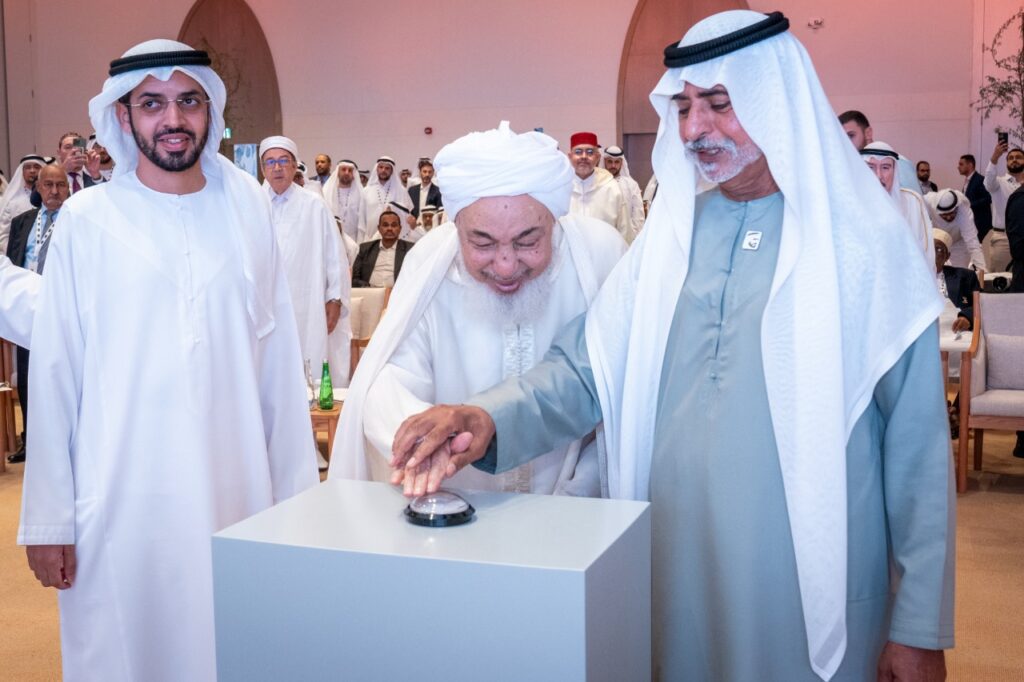During the Second International Conference for the UAE Council for Fatwa, His Excellency Sheikh Nahyan bin Mubarak Al Nahyan, Minister of Tolerance and Coexistence, launched the “Abu Dhabi Charter for Scientific Developments”, in the presence of His Excellency Abdullah bin Bayyah, Chairman of the UAE Council for Fatwa, His Excellency Dr. Omar Habtoor Al Darei, Director General of the UAE Council for Fatwa, and many senior officials from various Fatwa and Shari’a-related bodies from around the world.
This charter is the first of its kind at the regional level, and it addresses Fatwa institutions, bodies and cadres who specialize in Fatwa and Shari’a.
The charter is issued to urge the need for consolidation of efforts, exchange of expertise and the identification and formulation of the most accurate perceptions possible of scientific developments, to achieve a religiously correct and balanced conceptualization that corresponds to the challenges and changes in today’s world.
Charter and Vision: Guiding Fatwas in the Age of Rapid Technological Evolution
His Excellency Abdullah bin Bayyah, Chairman of the UAE Council for Fatwa, explained that the charter is based on the national vision of the UAE through the qualitative projects and proactive initiatives of the state in 2023, the Year of Sustainability, calling it, “A response to the emergence of new inventions and discoveries, the current rapid digital development that causes a paradigm shift in various areas of life, such as health, economics, space science, energy, climate, agriculture and artificial intelligence, and addressing the questions arising about the provisions of Shari’a concerning those changes, as there is no reference text or previous examples to be used in measurement and jurisprudence.”
His Excellency added that the charter also considers the fact that Fatwas require jurisprudence based on both the full understanding of the systematic and fundamentalist Shari’a controls and full identification of perceptions regarding existing scientific and current development to see them in the light of Fiqh and Shari’a.
He said, “This requires taking into consideration reason, function, benefit and drawbacks of such new variables that affect people’s lives and livelihood, all based on an understanding of the core of Islamic values. Islamic jurisprudence takes into account the aims and objectives of life’s elements, realities and the need to be open to developments and advancement, the use of modern science and experience for the benefit of mankind, and the comprehensive conceptualization of all the scientific and factual dimensions considered in the issuing of Fatwa following the scholarly principles, purposes and rules of Shari’a, as well as ensuring the sustainability of the issuance of Fatwas that correspond to the reality and expectation of current times, characterized by ease of communication and enormous technical development.”
Harmonizing Scientific Progress with Shari’a: The Role of the Charter
Dr. Omar Habtoor Al-Darei, Director General of the UAE Council for Fatwa, emphasized that the charter serves as an initial step in harmonizing scientific advancements with Shari’a principles and values.
It aims to provide effective solutions and methodologies while ensuring adherence to Shari’a and Fiqh, connecting the evolving reality, Shari’a, and relevant scripture in a coherent manner.
He added, “The charter provides a scholarly reference and a specific framework and approaches to manage Fatwa regarding scientific developments, and the rules and methods utilized in dealing with them, based on the essence of conceptualizing such developments, which includes inclusiveness, jurisprudence, extrapolation and integration, through exploring Shari’a, scientific considerations, necessary determinants, accommodation of modern applications, and maintaining sustainability based on Fiqh and Shari’a principles that require extensive efforts to pave the way for positive interaction with new cosmic science and knowledge.”
The Second International Conference highlights the UAE’s leadership in scientific and technological advancements, promoting openness to diverse scientific disciplines and cultures. It also emphasizes the importance of upholding national values rooted in Islamic teachings and Emirati humanitarian principles.
Furthermore, the conference aims to enhance the role of Fatwa bodies and institutions in cultural jurisprudence and Shari’a, aligning with contemporary developments. It seeks to activate cultural Fiqh jurisprudence tools and update approaches for making appropriate judgments in response to the rapid scientific and technological progress in society.


